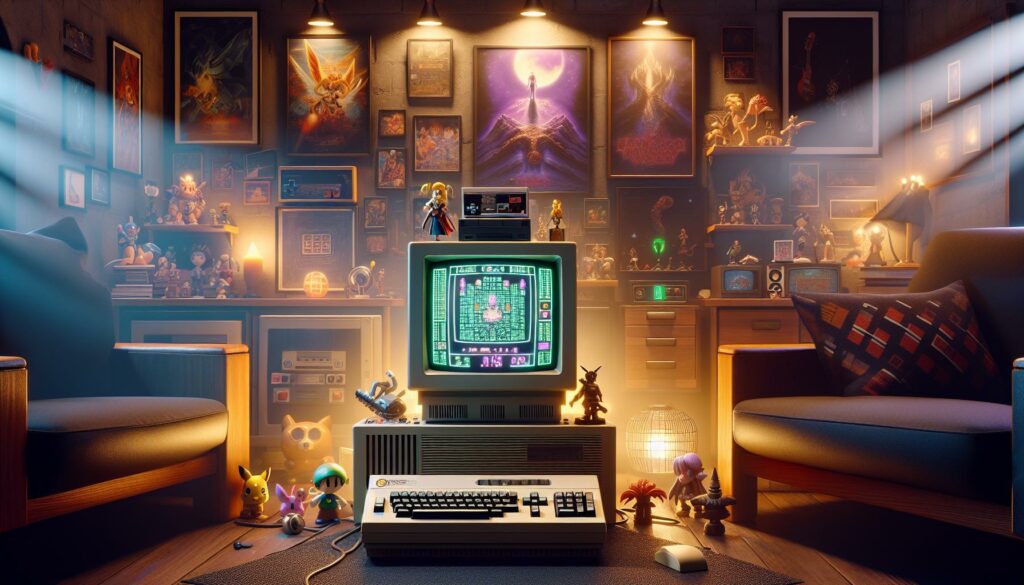As a lifelong PC gamer I’ve witnessed the incredible evolution of RPG games from their humble pixelated beginnings to today’s stunning 3D worlds. The golden age of PC RPGs during the late 90s and early 2000s holds a special place in my heart with classics that shaped the entire gaming industry.
I’m constantly amazed at how games like Baldur’s Gate Planescape: Torment and Fallout created deep immersive experiences despite their technical limitations. These pioneering titles didn’t just tell compelling stories – they established core RPG mechanics we still see in modern games. From character customization to branching dialogues and meaningful choices these old-school gems laid the foundation for everything that followed.
Key Takeaways
- Classic PC RPGs from the 80s and 90s like Baldur’s Gate, Fallout, and Planescape: Torment established fundamental mechanics still used in modern games, including character customization and branching dialogues
- The Ultima series revolutionized PC gaming by introducing the first persistent open world, NPC routines, and karma systems that tracked player choices and actions
- BioWare’s games, particularly Baldur’s Gate and Neverwinter Nights, set new standards for storytelling and combat systems, offering 100+ hours of gameplay and extensive character development options
- Japanese RPG series like Final Fantasy and Dragon Quest brought unique storytelling elements to PC gaming through enhanced ports featuring improved graphics, custom controls, and modding support
- Modern platforms like Steam and GOG.com now offer optimized versions of classic RPGs with enhanced editions, high-resolution display support, and modern OS compatibility
Old RPG games for PC
The 1980s marked the emergence of groundbreaking PC RPGs that revolutionized digital storytelling. I’ve witnessed how these pioneering titles established core mechanics that shaped the entire gaming industry.
Ultima Series Legacy
The Ultima series transformed PC gaming with its innovative gameplay elements across 9 mainline titles from 1981 to 1999. Lord British’s creation introduced the first persistent open world in Ultima IV: Quest of the Avatar, featuring NPCs with daily routines, a karma system tracking player actions. The series established key RPG mechanics:
- Character attribute systems with strength, intelligence, dexterity stats
- Interactive environments allowing players to move objects, pick locks
- Overhead view world exploration with turn-based combat
- Morality choices affecting storyline progression
- Party-based gameplay with recruitable companions
Wizardry’s Impact on the Genre
Wizardry: Proving Grounds of the Mad Overlord launched in 1981, pioneering first-person dungeon crawling mechanics. The series influenced Japanese RPG development through features like:
- Grid-based movement through 3D wireframe dungeons
- Six-character party creation with distinct classes
- Race selection affecting character attributes
- Complex turn-based combat system
- Character alignment system impacting party dynamics
| Game Series | Year | Mechanic Borrowed |
|---|---|---|
| Dragon Quest | 1986 | First-person battles |
| Phantasy Star | 1987 | 3D dungeon design |
| Final Fantasy | 1987 | Party-based combat |
Classic BioWare Masterpieces
BioWare established its legacy in RPG gaming through groundbreaking titles that redefined character development and storytelling. These games introduced innovative mechanics and rich narratives that reshaped the RPG landscape.
Baldur’s Gate Series
The Baldur’s Gate series revolutionized RPGs by introducing the Infinity Engine’s real-time-with-pause combat system in 1998. The games feature intricate character creation options based on Advanced Dungeons & Dragons 2nd Edition rules with 6 core attributes 11 character classes. Each playthrough offers 100+ hours of gameplay across sprawling environments including cities forests dungeons. I’ve found the companion system particularly compelling with memorable characters like Minsc Jaheira Viconia whose personal storylines interweave with the main narrative.
Neverwinter Nights
Neverwinter Nights (2002) elevated multiplayer RPG experiences through its Aurora Engine toolset. The game includes:
- 4 distinct campaign chapters with 40+ hours of single-player content
- Custom module creation tools enabling user-generated content
- 8 base character classes expandable to 40+ prestige classes
- Multiplayer support for up to 64 players simultaneously
- Dynamic Dungeon Master features for live campaign modifications
Player progression follows D&D 3rd Edition rules featuring:
| Aspect | Details |
|---|---|
| Level Cap | 40 levels |
| Base Stats | 6 attributes ranging 3-18 |
| Skills | 16 unique skills |
| Feats | 100+ character abilities |
The expansion packs Shadows of Undrentide Hordes of the Underdark added significant content including higher-level gameplay epic-level progression systems.
Iconic Black Isle Studios Games
Black Isle Studios elevated the RPG genre with groundbreaking titles that emphasized player choice and narrative depth. Their games redefined post-apocalyptic storytelling and philosophical exploration in digital entertainment.
Fallout 1 & 2
Fallout introduced a post-nuclear world using the SPECIAL character system with 7 primary attributes. The game features turn-based combat with targeted attacks allowing players to aim at specific body parts for tactical advantages. Fallout 2 expanded the formula with a larger world map containing 23 major locations including New Reno, Vault City and the NCR. Both games offer 150+ hours of gameplay with multiple quest solutions ranging from diplomatic negotiations to aggressive confrontations.
| Game Feature | Fallout 1 | Fallout 2 |
|---|---|---|
| Release Year | 1997 | 1998 |
| Map Size | 12 major locations | 23 major locations |
| Companions | 5 recruitable | 13 recruitable |
| Dialogue Options | 65,000+ words | 525,000+ words |
Planescape: Torment
Planescape: Torment reimagined RPG storytelling through its unique setting in the D&D Planescape universe. The game contains 800,000+ words of dialogue exploring themes of identity and mortality. Players control The Nameless One, an immortal character who awakens in Sigil with amnesia and retains abilities from previous lives. The game features 25 possible endings based on choices made throughout the narrative including alignment shifts, companion relationships and philosophical stances.
| Story Element | Statistics |
|---|---|
| Word Count | 800,000+ |
| Possible Endings | 25 |
| Companion Characters | 7 |
| Different Alignments | 9 |
Essential Japanese PC RPGs
Japanese RPGs brought unique storytelling elements and innovative gameplay mechanics to PC gaming through strategic ports and adaptations of popular console titles.
Final Fantasy Series on PC
Square Enix transformed PC gaming with its Final Fantasy ports, starting with Final Fantasy VII in 1998. The PC versions introduced enhanced graphics options, custom keyboard controls and modding capabilities. Notable releases include:
- Final Fantasy VII (1998): Features 60 hours of gameplay with 40 different battle commands
- Final Fantasy VIII (2000): Includes Triple Triad card game with 110 unique cards
- Final Fantasy XI (2002): First MMORPG in the series supporting 200,000 concurrent players
- Final Fantasy XIV (2010/2013): Offers 20 unique job classes across 4 combat roles
| Game | Release Year | Notable Features |
|---|---|---|
| FF VII | 1998 | Direct3D support, custom controls |
| FF VIII | 2000 | Chocobo World minigame integration |
| FF XI | 2002 | Cross-platform play with PS2/Xbox 360 |
| FF XIV | 2013 | DirectX 11 support, 4K resolution |
- Dragon Quest XI (2018): Features 100+ hours of content across 2 distinct visual modes
- Dragon Quest Heroes (2015): Combines RPG elements with action combat for 30+ playable characters
- Dragon Quest Builders (2016): Integrates RPG mechanics with building elements in 4 unique chapters
| Game | Combat Style | Average Completion Time |
|---|---|---|
| DQ XI | Turn-based | 60-80 hours |
| DQ Heroes | Action RPG | 30-40 hours |
| DQ Builders | Hybrid | 40-50 hours |
Modern Ways to Play Retro RPGs
Digital platforms & emulation services have revolutionized access to classic RPGs, making these gems accessible on modern hardware. Here’s how to experience these timeless adventures today.
Digital Distribution Platforms
Steam’s classic games collection offers optimized versions of RPGs like Baldur’s Gate: Enhanced Edition & Planescape: Torment: Enhanced Edition. GOG.com specializes in DRM-free versions of retro titles, featuring:
- Pre-configured DOSBox integration for seamless gameplay
- Modern OS compatibility patches included
- High-resolution display support up to 4K
- Cloud save functionality
- Additional content packs & mods
| Platform | Notable Features | Number of Classic RPGs |
|---|---|---|
| Steam | Enhanced Editions, Workshop Support | 200+ |
| GOG.com | DRM-free, DOSBox Integration | 300+ |
| Epic Store | Modern Remasters | 50+ |
Emulation and Preservation
Emulation software recreates original hardware environments, enabling authentic gameplay experiences. Popular emulators include:
- DOSBox for MS-DOS RPGs like Ultima & Might and Magic
- ScummVM for point-and-click RPG adventures
- RetroArch for multi-system emulation support
- PCSX2 for PlayStation 2 RPG classics
- ePSXe for original PlayStation titles
| Emulator | Compatible Systems | Recommended Games |
|---|---|---|
| DOSBox | MS-DOS | 1000+ |
| ScummVM | Multiple Platforms | 250+ |
| RetroArch | 100+ Systems | 2000+ |
- Custom shader configurations for CRT effects
- Input mapping for modern controllers
- Save state functionality for convenience
- Widescreen patches for select titles
- Performance optimization presets
Old RPG games
Old RPG games for PC represent more than just nostalgic pixels and classic soundtracks. I’ve seen firsthand how these pioneering titles laid the foundation for modern gaming through their innovative mechanics storytelling depth and unforgettable characters.
While graphics have evolved dramatically the core elements these games introduced – from complex character systems to branching narratives – continue to influence today’s gaming landscape. I’m thrilled that modern technology has made it easier than ever to experience these classics through digital platforms and emulation.
These timeless adventures prove that great gameplay and compelling storytelling never go out of style. Whether you’re revisiting old favorites or discovering them for the first time there’s never been a better moment to explore the rich legacy of PC RPGs.

